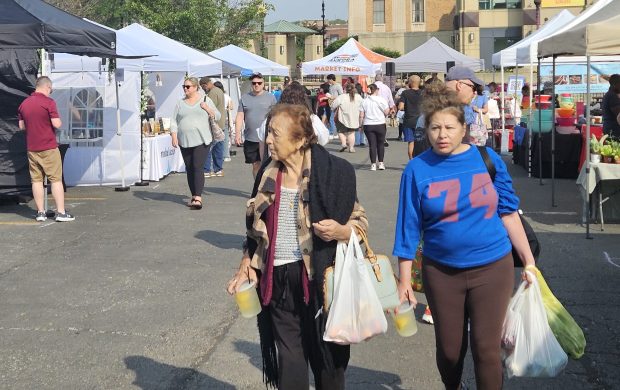It’s hard for most of us to wrap our heads around the level of anxiety and fear that’s hit so many immigrants in our communities.
I’ve spoken to enough people who work with this population to know mistrust is running rampant since Donald Trump moved into the White House with a series of moves targeting this population
One undocumented immigrant who has lived here decades and is fully integrated into the schools, churches and neighborhoods, says he now looks with suspicion on those once considered neighbors and even friends.
Whether perceived or real, fear is a powerful emotion. And Aurora area social workers have also been feeling more stress as they try to keep up with headlines that change from day to day.
“It really hit me: I can’t mess this up,” said Katie Arko, executive director of Aurora Area Interfaith Food Pantry. “These people’s lives depend on the pantry every week.”
Since Trump’s executive orders, she added, “a tremendous amount of time” has been spent “so we can be as prepared as possible,” which includes “watching the numbers closely.”
While visitors to the pantry have “generally been holding steady,” Arko noted an uptick in Friday’s newly-added curbside option, which allows clients to stay in their cars rather than go into the building. And there’s been an even more significant rise in Interfaith’s “Pantry-to-go” program which provides home deliveries.
At Marie Wilkinson Food Pantry in Aurora, Executive Director Annette Johnson points to a 13% increase in visitors, which she says is likely connected to the fact only a pick-up system is being used currently at the Highland Avenue headquarters.
“Our guests just feel safer in their cars,” she said.
And in their homes.
What has “really caught us off guard,” Johnson said, are the swelled numbers at East Aurora High School’s satellite pantry, particularly on Kids Day, when youngsters can pick up bags of groceries for their families every other Thursday.
Two weeks ago, “we had to turn kids away for the first time,” she said.
But this week was even “more remarkable,” she pointed out, with numbers jumping from 80 or so to more than 180.
“We tried to keep up but the kids kept coming,” Johnson said, which resulted in more staff coming to help students from the district’s Transitions Program, who pack groceries in bags and unload and sort incoming donations.
There’s no question “some are afraid to come out in public,” Arko agreed, noting that, after holding steady at 75 students served a week, Interfaith’s satellite pantry at Jefferson Middle School took a sudden jump to about 100.
“The level of fear is heartbreaking. Their lives are difficult enough without making it more difficult,” she said. “Imagine what this is doing to their mental health.”
Eric Ward, executive director of Family Counseling Services, doesn’t have to.
“Every Latino staff person for the last two weeks has been working with parents who are scared,” he told me. “And that is taking away from our mission” of helping them “navigate mental health challenges.”
But Ward puts much of the blame on too many people “listening to rumors from 10 different sources,” including social media and mainstream media that are agenda-driven.
Ward says he’s telling his staff to stay away from those rumors and innuendos, as well as the politics behind them.
“Clients are calling our staff asking if they should send their kids to school because ICE will take them out,” he said. “I tell them that’s not how it works. We are a nonprofit. Can you imagine the optics of breaking into a mental health agency and removing children?
“This is what rhetoric does to people who don’t have the means to access truth. It stokes worry and fear.”
Which is why, he added, “the most important thing we can do is help them with a reality check.”
That’s what the office of state Rep. Barbara Hernandez, D-Aurora, has been working hard to do after a barrage of phone calls from terrified individuals. While things “have calmed down” to a degree, anxiety and mistrust will continue to impact immigrant communities, she said.
As well as those who help them.
Arko says Aurora Area Interfaith Food Pantry is receiving weekly requests from churches and other nonprofits serving mostly Hispanic bases, seeking food for families afraid to go into public places, including pantries,.
And so, “we are working on formalizing a plan to do our best to help these families,” she said, while “ensuring we are not taking away” from their regular visitors.
“We are just one tiny little corner of the world, and think about how much time we have spent making sure we can pivot if needed,” she said. “Imagine all the other nonprofits and what they are doing.”
Sometimes discouraged but always determined, Arko can’t help but compare the current narrative shaping our country’s storyline to a bad movie.
“Unfortunately, we can’t walk out,” she said. “Or ask for a refund.”
dcrosby@tribpub.com




